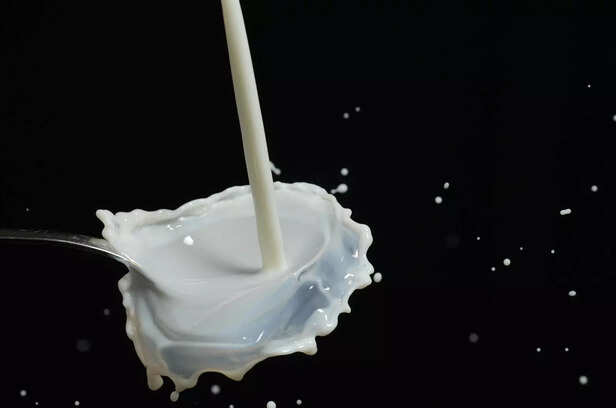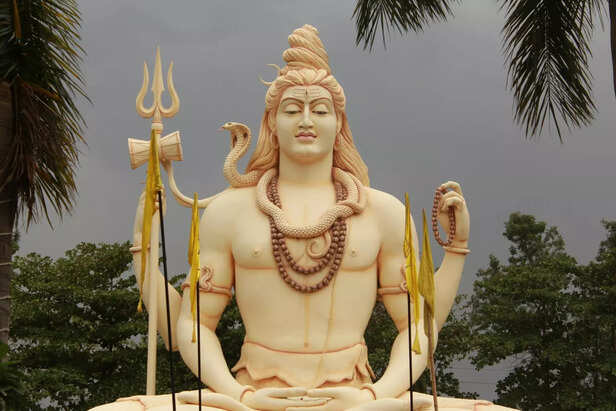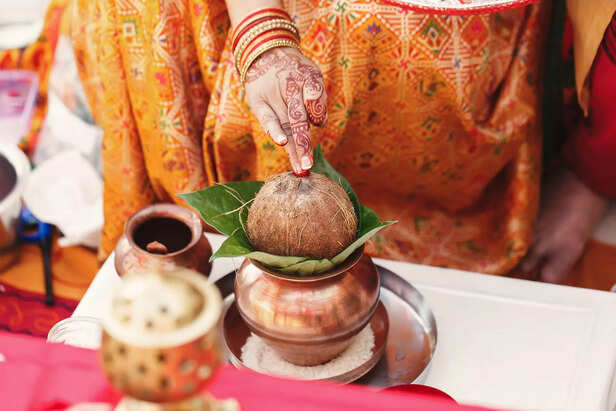Why Do Hindus Offer Milk to Shiva? Is Milk Shiva’s Favorite Offering?
Riya Kumari | Jun 26, 2025, 16:06 IST
Shiva
( Image credit : Times Life Bureau )
Okay, so picture this: It’s 5:45 AM. You’re half-asleep, wrapped in your mother’s dupatta because she dragged you to the temple “just for darshan,” and suddenly you see it—milk. Pouring. On a stone. A lot of milk. Cold. White. Creamy. Flowing down the neck of a deity who, quite frankly, looks like he’s definitely lactose intolerant.
We’ve all seen it. Early morning at the temple—bare feet on cold stone, chants rising in the air, and a line of people patiently waiting for their turn. In their hands? Steel pots, copper bowls, sometimes even plastic tumblers—filled with milk. Not for drinking. Not for the poor. But to pour—gently, rhythmically—over a black stone shaped like a symbol. The Shiva Linga. And if you’ve ever stood there wondering, Why milk? Why Shiva?—you’re not alone. It’s a fair question. And the answer, like most things sacred, doesn’t fit neatly into one sentence. Because it’s not just about Shiva. Or milk. It’s about us.
Milk Is Not Just Milk

Start here: milk isn’t a drink in this context. It’s a symbol. It stands for purity, nourishment, the essence of life. It is what a mother gives her child when they are too small to ask. It is love without condition. Sustenance without transaction. To offer milk is to offer something gentle in a world that isn’t. It is to offer care, in a universe that often feels careless.
And when it's offered to Lord Shiva—a god who embodies both the destroyer and the meditative stillness beyond creation—it becomes more than a ritual. It becomes an act of balance. Of healing.
Why Shiva? Because He Represents What We Can’t Always Say

Shiva is not the god of convention. He is not seated on a golden throne, surrounded by ornament and hierarchy. He is the one who sits in silence, in stillness, in wildness. Covered in ash, wrapped in tiger skin, a snake around his neck—not to frighten, but to show us he has mastered fear.
He is not impressed by gold or performance. Which is why the milk matters. Because in our small human way, when we offer milk, we are saying:
“I don’t have anything grand. I don’t have it all figured out. But this—this little bowl of calm, this small gesture of surrender—I offer this to you.”
And Shiva, in every story, accepts that offering—not because He needs it, but because we do.
It's Not Just About the Ritual. It's About What Happens Inside Us

Most people think of rituals as actions we do for the divine. But really, they are things we do to remember the divine within ourselves. Milk over Shiva’s Linga is not just about cooling the fiery Neelkanth who drank poison. It’s about cooling ourselves.
Our tempers. Our grief. Our confusion. Our ego. Each drop is a quiet undoing of the chaos we carry. Each offering, a reminder that we are not here to control everything. That it’s okay—necessary, even—to let go.
The Question of Waste

Yes, it comes up. And it should. In a world where hunger exists, is it okay to pour milk on stone? And the answer, like most wise things, is not black or white. In ancient times, what was offered was often shared—prasad. A portion of it, at least, returned to the people. That is still possible today. Many temples do it. And many more must.
Because devotion that forgets compassion is just noise. And God—especially a god like Shiva—doesn’t need noise. He needs truth. Simplicity. Honesty. If your heart is sincere, even a spoon of water is enough.
So Why Do We Still Do It?
Because some things don’t belong to logic alone. Some things are emotional truths. Some things are ancestral memories passed down in silence. And because in a world that teaches us to get, to win, to claim—this ritual teaches us to give. Maybe milk is just the medium. And the real offering is your attention. Your humility. Your willingness to stop trying to be the god of your own life, and instead sit for a moment in front of something greater.
Because Shiva does not ask for your money. Or your perfection. Or your power. He asks you to come as you are. To pour whatever you have. And to trust that even in your smallest gesture, something sacred is happening. Not to Him. But to you.
Milk Is Not Just Milk

Milk
( Image credit : Pexels )
Start here: milk isn’t a drink in this context. It’s a symbol. It stands for purity, nourishment, the essence of life. It is what a mother gives her child when they are too small to ask. It is love without condition. Sustenance without transaction. To offer milk is to offer something gentle in a world that isn’t. It is to offer care, in a universe that often feels careless.
And when it's offered to Lord Shiva—a god who embodies both the destroyer and the meditative stillness beyond creation—it becomes more than a ritual. It becomes an act of balance. Of healing.
Why Shiva? Because He Represents What We Can’t Always Say

Shiva
( Image credit : Pexels )
Shiva is not the god of convention. He is not seated on a golden throne, surrounded by ornament and hierarchy. He is the one who sits in silence, in stillness, in wildness. Covered in ash, wrapped in tiger skin, a snake around his neck—not to frighten, but to show us he has mastered fear.
He is not impressed by gold or performance. Which is why the milk matters. Because in our small human way, when we offer milk, we are saying:
“I don’t have anything grand. I don’t have it all figured out. But this—this little bowl of calm, this small gesture of surrender—I offer this to you.”
And Shiva, in every story, accepts that offering—not because He needs it, but because we do.
It's Not Just About the Ritual. It's About What Happens Inside Us

Pray
( Image credit : Pexels )
Most people think of rituals as actions we do for the divine. But really, they are things we do to remember the divine within ourselves. Milk over Shiva’s Linga is not just about cooling the fiery Neelkanth who drank poison. It’s about cooling ourselves.
Our tempers. Our grief. Our confusion. Our ego. Each drop is a quiet undoing of the chaos we carry. Each offering, a reminder that we are not here to control everything. That it’s okay—necessary, even—to let go.
The Question of Waste

Puja
( Image credit : Freepik )
Yes, it comes up. And it should. In a world where hunger exists, is it okay to pour milk on stone? And the answer, like most wise things, is not black or white. In ancient times, what was offered was often shared—prasad. A portion of it, at least, returned to the people. That is still possible today. Many temples do it. And many more must.
Because devotion that forgets compassion is just noise. And God—especially a god like Shiva—doesn’t need noise. He needs truth. Simplicity. Honesty. If your heart is sincere, even a spoon of water is enough.
So Why Do We Still Do It?
Because Shiva does not ask for your money. Or your perfection. Or your power. He asks you to come as you are. To pour whatever you have. And to trust that even in your smallest gesture, something sacred is happening. Not to Him. But to you.
